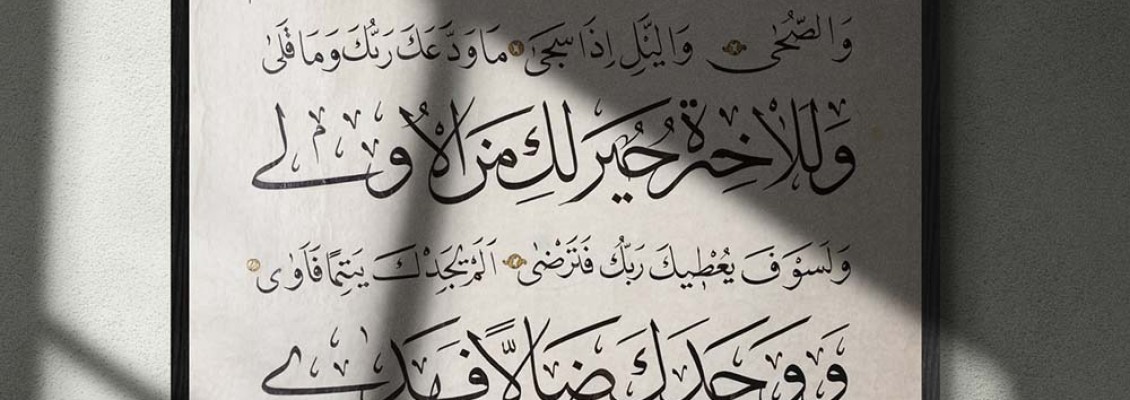
SURAH AD-DUHAA: A CHAPTER OF COMFORT AND COMPASSION
Allah is the sole creator who bears the attributes of compassion, protector, bestower and so on. These attributes of His indicate His stance towards people when they are in need of help and support. In times of need, who better to turn to than the one who intricately designed our very being? Surah ad-Duhaa, a chapter in the Quran, emerges as a touching response to emotional distress. Addressed to Prophet Muhammad during a period of profound sadness, it includes a timeless message that transcends the historical context. Like a soothing balm for the wounded heart, the verses of ad-Duhaa extend beyond the Prophet's personal experience, becoming an emotional anchor for every Muslim.
By the morning sunlight,
and the night when it falls still!
Your Lord ˹O Prophet˺ has not abandoned you, nor has He become hateful ˹of you˺. [Quran 93:1-3]
Surah starts with an oat towards the morning light and the night. The morning light is thought to be the light of revelation and Islam in contrast to darkness. Also, non-believers and the opponents of Prophet Muhammad would listen to him in secret while he was reciting the Quran at night. This oath serves as a compelling response to the claims of pagans who, in a period of apparent silence from Allah for a duration unknown, asserted that the Prophet Muhammad had been abandoned. In these verses, Allah clearly stated that this is not because he abandoned him. I, as a Muslim woman, always feel deeply moved when I read these verses as I feel like Allah addresses me and assures me I will not be abandoned as long as I am on the right path.
And the next life is certainly far better for you than this one.
And ˹surely˺ your Lord will give so much to you that you will be pleased. [Quran 93:4-5]
These statements can be understood in two ways. The next life can mean that Allah promises to the Prophet Muhammad that his prophethood would be better than it was before. This promise was fulfilled as Prophet Muhammad’s congregation grew rapidly later on and he was loved deeply by them even though he encountered various hardships along the way. Even today he remains one of the most influential and exemplified people on earth. The next life can also refer to the afterlife, indicating that the earthly pleasures and hardship will pass and everything will be much better in the afterlife for those who deserve it.
Did He not find you as an orphan then sheltered you?
Did He not find you unguided then guided you?
And did He not find you needy then satisfied your needs? [Quran 93:6-8]
In these verses, Allah tenderly addresses Prophet Muhammad, invoking reflection upon the journey of the Prophet. The rhetorical questions posed by these verses not only highlight the benevolence of Allah but also serve as a powerful reminder to believers of His continuous guidance, care, and provision. The verses draw attention to the early years of the Prophet's life, marked by the loss of both parents, and his life before prophethood when the Prophet lived in a society engulfed in ignorance and idolatry. Allah, in His infinite mercy, became the shelter for the orphaned heart of Prophet Muhammad and chose to guide the Prophet Muhammad, illuminating his path with the light of divine revelation. These verses serve as a universal message for believers, inviting them to reflect upon their own lives. Just as Allah cared for the Prophet in times of vulnerability, believers are reminded that Allah is the ultimate guardian, guide, and provider.
So do not oppress the orphan,
nor repulse the beggar.
And proclaim the blessings of your Lord. [Quran 93:9-11]
The concluding verses of Surah ad-Duhaa provide a clear ethical guideline, urging believers to show compassion and benevolence towards the people who are vulnerable and needy. In these verses, Allah specifically addresses the Prophet Muhammad, and by extension, all believers, emphasizing the importance of treating orphans and beggars with kindness and dignity. It highlights the social responsibility of believers towards the less fortunate.
The surah beckons believers to reflect upon the support of Allah, the ultimate bestower of blessings and mercy. It serves as a reminder that, just as Allah consoled and uplifted the Prophet Muhammad, He stands ready to embrace and aid His creation in their moments of need. The attributes of Allah outlined in ad-Duhaa – the compassionate, the protector, the bestower – reaffirm a profound truth: in our struggles, we are not alone. It encourages believers to emulate the example set by Prophet Muhammad, finding strength in faith and resilience in the face of adversity. The surah, therefore, becomes a guiding light, illuminating the path towards emotional well-being and spiritual tranquillity.

Leave a Comment